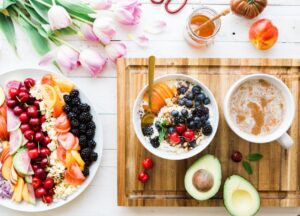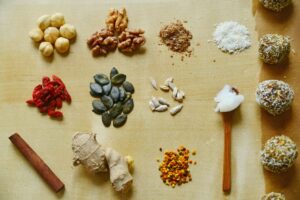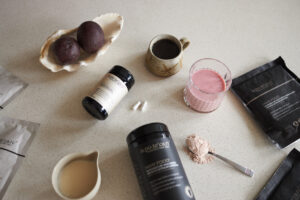We all know the importance of a healthy, balanced diet for our overall health, but just how important is diet to the health of your hair? We explore how eating a balanced diet with the right nutrients can help promote healthy hair growth.
A healthy diet should contain protein, fruits, vegetables, grains, and an appropriate amount of fat. Deficiency of certain macro or micronutrients will typically reflect in the hair.
Fruits and vegetables
Fruit and veggies offer a plethora of nutritional molecules. These include vitamins, minerals, enzymes, polyphenols, prebiotics, water, complex carbs, fibre and trace elements. They are the ultimate nutritional superstars, providing us with a unique mix of super-healthy components. Blood analysis of people eating a vegetable-rich diet reveals an antioxidant status increase of 50%1.
Aim for 5 serves of brightly coloured vegetables and 2 serves of fruit per day.

Avocados are nutritious and a great source of healthy fats. They are also an excellent source of vitamin E, which may promote hair growth. One medium avocado provides 21% of your daily vitamin E needs. Like vitamin C, vitamin E is an antioxidant that helps combat oxidative stress by neutralising free radicals. Vitamin E also protects areas of the skin, like the scalp, from oxidative stress and damage. Damaged skin on the scalp can result in poor hair quality and fewer hair follicles.
Beetroot is a mineral rich root vegetable high in fibre, minerals, vitamins and electrolytes. These vitamins and minerals nourish the hair follicles helping them to produce strong and healthy strands. Beetroot is also rich in nitrates. These nitrates are converted to nitric oxide in the body which supports blood vessel dilation and circulation. Good circulation to the scalp allows nutrient-rich blood flow and oxygen to reach the follicles.
Berries are loaded with beneficial compounds and vitamins that may promote hair growth. They’re high in antioxidants such as vitamin C which can help protect hair follicles against damage from harmful molecules called free radicals. The body also uses vitamin C to produce collagen, a protein that helps strengthen hair to prevent it from becoming brittle and breaking. Vitamin C assists the body with iron absorption and low iron levels may lead to hair loss.

Capsicums are also an excellent source of vitamin C, which may support hair growth. One yellow capsicum provides nearly 5.5 times as much vitamin C as an orange.
Carrots offer an excellent source of beta-carotene, the carotenoid that the body most efficiently converts to Vitamin A. This important vitamin is great for hair strength and is required by the skin to produce sebum which keeps the scalp moisturized and healthy, which in turn supports hair growth.
Dark green vegetables contain high amounts of vitamins A and C, which help with the production of sebum and provides a natural hair conditioner2. Spinach is loaded with folate, iron, and vitamins A and C, which may promote hair growth. A deficiency in these nutrients may also result in hair loss. Spinach is also a great plant-based source of iron, which is essential for hair growth. Iron helps red blood cells carry oxygen throughout the body to fuel your metabolism and aid growth and repair.
Protein
Your body uses proteins to build tissue cells — including the cells of your hair. Over 80% of your hair is composed of a protein called keratin. Dietary proteins are composed of amino acids, which are your hair’s building blocks, they make your hair strong. Without sufficient protein, hair can become brittle and fall out prematurely.
Aim for 50g of protein per day as part of a balanced diet.
Eggs are a great source of both protein and biotin, which are important for hair health and growth. A deficiency in either of these nutrients has been linked to hair loss and brittle hair. Biotin is essential to produce a hair protein called keratin. Research has also shown that consuming more biotin can help improve hair growth in people with a biotin deficiency. Eggs are also a great source of zinc, selenium and other healthy-hair nutrients. This makes them one of the best foods to consume for optimal hair health.

Legumes (kidney beans, peas and lentils) also provide a good source of plant-based protein along with iron, zinc, fibre and biotin. Fish and lean meats offer a very rich source of protein to easily satisfy your daily protein intake requirement.
Fast Food
An occasional saviour, we hear you! But when convenience moves to reliance, fast food can get in the way of your hair goals. This is usually because what fast food offers in convenience, it lacks in nutrition. The nature of fast food is just that, it’s fast, can taste delicious and does the job when cooking just isn’t an option. Unfortunately, to arrive at those price points and ramp up the flavour, fast foods rely on cheap ingredients that are often high in kilojoules, trans- and saturated-fats, artificial enhancers, salt, and sugars and lower in fibre and nutrition.

Trans fatty acids are unsaturated but, unlike the ‘good’ unsaturated fatty acids found in fish and vegetable oils, they behave similarly to saturated fats in the body and have similar health issues.5 While Australians consume relatively low amounts of trans fats compared to other countries, the volume of saturated fats consumed is of greater concern3.
Both trans fats and saturated fats increase the level of ‘bad’ cholesterol, with trans fats also decreasing the level of ‘good’ cholesterol. This can cause several serious health problems.3 Based on these effects; the recommendation is to limit their intake as much as possible.
By reducing your fast food consumption, you’ll be minimizing the amounts of saturated fats, salts and sugars entering your body. What many people don’t realise is the link between fast food consumption and nutritional deficiency. Excessive consumption of this type of food can create dietary deficiencies which can lead to hair loss. By selecting alternative options or cooking and preparing food at home, you’ll have greater control in ensuring your body receives the nutrients it needs to support hair growth and scalp health.
Try to limit fast foods to once per week or less and viewing them as a treat rather than a necessity.
Good oils
Onto the good stuff. Dietary fat intake can often be confusing due to the conflicting information surrounding this topic following decades of focus on low-fat diets. However, the last 30 years has seen a big shift in the way health experts and nutrition scientists view certain types of fats and oil. A significant body of research supports the unique health benefits of diets that contain plant and marine sources of unsaturated fats4.
A global survey found that 95% of respondents knew that vitamins were needed for a healthy diet, but only 41% knew certain fats were essential nutrients5. Essential nutrients are so-called because they cannot be made by the body and must be obtained through diet. So how can good fats help your hair? “Good fats” include polyunsaturated fatty acids (PUFAs) such as essential fatty acids omega-3 and omega-6. By eating plenty of avocados, salmon, and vegetable/olive oil, you’ll supply your hair and scalp with natural oils to help hydrate and moisturise a dry scalp.

Fatty acids are vital nutrients that are essential for hair growth. Low or nonfat diets can result in hair loss as the lack of fat causes the skin and scalp to become dry. Bad fats can also encourage the production of DHT (Dihydrotestosterone). DHT derives from testosterone and in large quantities it can attack the hair follicles, causing it to narrow and shrink which causes hair loss and thinning6. PUFA’S play an important role in cell structure, barrier function, lipid synthesis, inflammation and immunity.
Seeds deliver a massive amount of nutrients with relatively few calories. Certain seeds like flaxseeds and chia seeds also provide omega-3 fatty acids.
Nuts offer a plethora of healthy fats and other nutrients. Brazil nuts are a natural source of selenium. Walnuts contain zinc and alpha-linolenic acid, an omega-3 fatty acid that may help hair condition. Pecans, cashews and almonds also contain zinc. Zinc deficiency can lead to hair shedding2.
Where Apotecari comes in
The Apotecari product suite is a comprehensive and expertly formulated range of nutritional supplements that can be used individually or layered in combination. This bioactive hair care collection offers targeted formulations that transform, elevate and evolve.
HAIR FOOD – offers a delicious formulation of plant-based proteins combined with beetroot powder, wholefood vitamin C and Australian bush superfoods. Take 6 g per day to up your dietary amino acid levels and support your body’s collagen production and antioxidant capacity.
MANE EVENT – A powerful vegan formulation to support intensified growth and strand repair. This nutrient dense daily supplement contains a wide array of essential vitamins, minerals and nutrients. Taking just 2 capsules per day helps to fill nutritional gaps and ensure the body has access to vital nutrients required for healthy hair growth.
CROWNING GLORY – The ultimate essential fatty acid and carotenoid rich formulation. Plant-sourced essential fatty acids rich in Omega-3 and Omega-6 blend with beta-carotene from nutrient rich microalgae to hydrate, nourish and calm the scalp. The important nutrients Vitamin D, Vitamin B2, zinc, selenium and calcium support growth and hair quality from within.

References
[1] Nantz MP et alImmunity and Antioxidant Capacity in Humans Is Enhanced by Consumption of a Dried, Encapsulated Fruit and Vegetable Juice Concentrate. Journal of Nutrition, Vol 136, pp 2606-2610
[2] The Trichological Society UK. Nutrition and Hair Health. Accessed Online [https://www.hairscientists.org/hair-and-scalp-conditions/nutrition-and-hair-health]
[3] Fats and Trans Fats. NSW Food Authority. Accessed Online [https://www.foodauthority.nsw.gov.au/consumer/keeping-food-safe/other-topics/fats-and-trans-fats]
[4] Liu AG, Ford, NA, Hu FB, Zelman KM, Mozaffarian D, Kris-Etherton PM. A healthy approach to dietary fats: understanding the science and takin action to reduce consumer confusion. Nut J. 2017;16(53):1-15.
[5] Diekman C, Malcolm K. Consumer perception and insights on fats and fatty acids: knowledge on the quality of diet fat. Ann Nutr Metab. 2009;54(Suppl 1):25–32.
[6] Bent, M. Nutrition and Hair Health. Accessed Online [https://www.hairscientists.org/hair-and-scalp-conditions/nutrition-and-hair-health]

